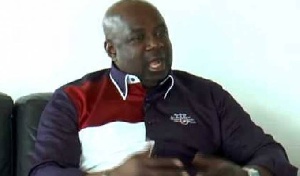 Former CEO of the Venture Capital Trust Fund, Daniel Duku
Former CEO of the Venture Capital Trust Fund, Daniel Duku
The Venture Capital Trust Fund (VCTF) is under immense financial strain as a result of alleged mismanagement and misappropriation of funds by one of its former bosses, Daniel Duku.
A source told the B&FT that a total disbursement of GH¢18.5million, done between 2010 and 2015, when Daniel Duku was CEO of the fund, could not be traced, and that interest on the money had shot it up to over GH¢40million.
The source indicated that when Mr. Duku took over in 2010, there was GH¢37million in the accounts of VCTF but as at the time he was leaving office in 2015, only GH¢3million was left.
The Venture Capital Trust Fund (VCTF) was established in 2004 through an Act of Parliament (VCTF Act 680), to provide low-cost financing to small and medium enterprises so as to enable them expand and create wealth and jobs.
In order to maintain a transparent system and prevent corrupt practices by management, the law establishing the fund does not allow for direct equity investment in or provision of debt to any company.
To access financing from the fund, there are two major means: through Venture Capital Finance Companies (VCFCs) or Special Purpose Vehicles (SPVs) but with specific approval by the board of directors.
The VCFCs are established in partnership with private and some other government institutions, and are headed by Fund Managers who are basically investment bankers and advisory service providers licensed by the Securities Exchange Commission (SEC).
The VCFCs include Bedrock Venture Capital Finance Limited, Gold Venture Capital Limited, Ebankese Fund Limited, and Activity Venture Finance Company.
The source said however that, Mr. Duku, who was on a monthly salary of US$15,000 and travelled frequently, disbursed GH¢18.5million to 205 companies without recourse to the laid down procedure, and without approval from the board.
A lot of these companies cannot be identified, with the name of Mr Duku’s personal driver George Aidoo coming up as supposedly owning three of the beneficiary companies, and benefiting from the fund to the tune of GH¢1million.
Another person close to Mr. Duku, who allegedly schemed and diverted monies was his Personal Assistant, Irene Anti-Mensah.
She is said to have later become an investment officer and connived to redirect monies to her husband’s company and to other family members. Mrs. Anti-Mensah was fired last year when her acts were uncovered.
The source noted that when payments were due and no monies were coming forth, investigations commenced and it came to light that some of the 205 companies that purportedly benefited from the “loot and share” are non-existent.
According to the law that establishes it, the fund is supposed to submit its financial statement to the Finance Ministry by September of every year. The source said, however, that for three years, from 2013 to 2015, the fund did not submit the financial statement and the Finance Ministry also did not bother to make it comply.
The Bureau of National Investigations (BNI) has taken up the matter and has invited both Mr. Duku and his driver Mr Aidoo for questioning. The matter is still under investigation.
Daniel Duku was replaced by Osman Sulemana in 2015, who has also been replaced by Yaw Owusu-Brempong, a seasoned financial industry professional.
Revival of Venture Capital Trust Fund
The fund, for the first time in four years, has been allocated GH¢219million in the 2017 budget to support Small and Medium Enterprises (SMEs) and drive up economic growth via equity investments.
The allocation is expected to offer alternative and cheaper source of capital for hundreds of small businesses across the country.
The last time the fund had budgetary allocation was in the 2012 budget which was implemented by former Finance Minister Dr. Kwabena Duffuor, with an amount of GH¢5million. This followed a 2011 allocation of GH¢10million.
No allocation was made in the 2013, 2014, 2015 and 2016 budgets, as a result of which managers kept calling for government support.
Since its establishment in 2003, the VCTF was funded from the National Reconstruction Levy which came to an end in 2006, and it has been funded from budgetary allocations until that also stopped in 2013.